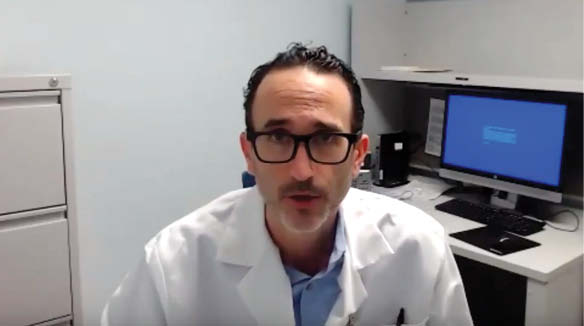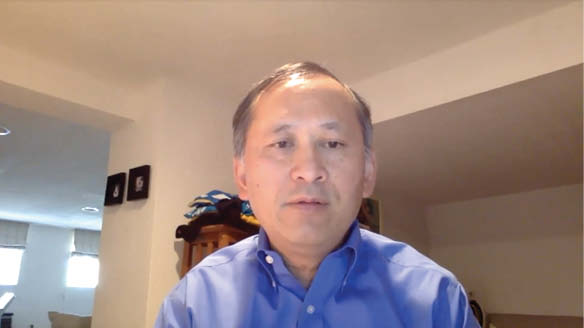Ethnic Media Services: Online Briefing For Ethnic Media
On Wednesday, April 8, Ethic Media Services had their third online briefing for ethnic media to hear from Medical and legal experts and advocates about the Coronavirus pandemic and its impact on the health and wellbeing of our communities.
Although statistics showing the impact of the coronavirus on some communities are not available, there are already alarming ethnic disparities in the country, so it is urgent that information on race and ethnicity be collected.
Dr. Tung Nguyen, professor of medicine at the University of California in San Francisco and director of the Asian American Health Research Center said that in Michigan, only 14% of the population is African American, but 33% of the cases and 41% of the deaths are of that race; while in Louisiana, 70% of the deaths are of African Americans, when they constitute only 32% of the population of that state.
“This is a disparity that can be seen in other states such as North Carolina and Washington D.C.”, he said. He urged local Public Health departments to collect and report information by race and ethnicity.
Worldwide, as of April 8, he said, there were 1.4 million reported cases of coronavirus, and 83,000 deaths in 184 countries.
In the United States, there are 400,000 reported cases with 13,000 deaths, but New York remains the hardest hit with 140 cases and 5,400 deaths.
Flattening The Curve Issues
Dr. Stacie L. Walton, MD, MPH discussed the alarming rise in COVID-19 related deaths amongst African Americans. She said that to flatten the curve, “we need to be staying home, using social distance and wearing masks when in public places, and make that really work in all communities, including African-American communities.
But also, he said, we need to recognize that there are many minority communities who cannot work at home and have no choice but to go out.
Daniel Turner-Lloveras, assistant professor of medicine at Harbor-UCLA Medical Center, said something has to be done to help groups that were already vulnerable before the Pandemic and anyone else facing barriers to accessing health care.
“We have to make sure that everyone, documented and undocumented, has equal access. We need to stop the arrest of immigrants seeking health care, as we have had reports of arrests, and that has to stop,” he said.
Testing And Treatment
Kerry Talbot, director of federal advocacy at the Immigration Hub, said the congressionally approved recovery packages do not provide enough financial support or health coverage for immigrants.
“We are concerned that during this crisis, we really need to make sure that everyone, citizens, residents, DACA (Deferred Action for Children) and TPS (Temporary Protected Status) beneficiaries, as well as undocumented immigrants, have access to testing and treatment. Without this, we are putting all of our communities at risk,” he said.
There is a state option for Medicaid, he said, but it does not protect undocumented immigrants or even those who have recently received their green cards.
But Talbot said there is money to help some immigrants get tested for the coronavirus at their community health centers, which the recovery package has given $3.3 billion to, even though it does not contain specific provisions to help them.
He added that they are very concerned about immigrants in detention, as this week they have received many reports that they are acquiring the coronavirus.
“Where’s My Pay” Website
Sunita Lough, IRS Deputy Commissioner, Services & Enforcement discussed the Economic Impact Payment of $1,200 for those with a social security number and $2,400 for couples who file their taxes, but only if they both have a social security number.
“There is only one exception, if you are a military husband with a social security number and your wife has an ITIN, you are eligible. Those who have filed tax returns in 2018 and 2019, do not have to do anything because they will be made a direct deposit to the bank account used for the tax refund; or, in the last case, they will be issued a check.”
Lough revealed that around April 17, they will have available a web application called ‘Where’s My Pay for Economic Impact,’” similar to ‘Where’s My Refund”.
“With the social security number, you can find out when you’re going to get it and what kind of payment. If on your 2018 and 2019 tax returns, you did not provide a bank account, as soon as the website opens, you can give us the information to make the direct deposit. That way you will receive the money faster than through a check,” she said.
Undocumented People
Sebastian Sanchez, Staff Attorney at Employment Rights Project, Bet Tzedek Legal Services discussed the challenges of filing for unemployment, who qualifies and how to manage a claim.
He said that unemployment benefits are not available to undocumented immigrants, even if they have been paying taxes, or whether or not they have an ITIN number. Not will they have access to any of the benefits approved in the coronavirus economic recovery package.
However, he revealed that they can benefit from sick pay and disability insurance in California because they are state-administered benefits.
“If your pay stub shows that you have paid state taxes, you are eligible. The problem is that on the forms to apply for payment, you are required to have a social security number, when most undocumented workers use a false number or someone else’s. If they use those, they can commit perjury,” he said.
If this is the case, the recommendation given is to use paper applications to request sick days or disability rather than online, and leave the social security number space blank.

Dr. Turner-Lloveras (above) is an assistant Professor of Medicine at Harbor-UCLA/David Geffen School of Medicine at the University of California Los Angeles at Harbor-UCLA.

Dr. Tung Nguyen, physician and researcher at UCSF University of California, San Francisco Asian American Health Research Center

